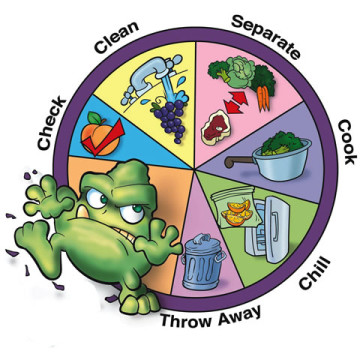How you handle food determines your wellbeing
For the average person these days, what is paramount is getting food to the table. This is okay, but we must also bear in mind that the only way our efforts can translate into better health for us and our family is to observe basic food safety at all times.
The World Health Organisation warns that globally and every year, two million people die as a result of food poisoning, underscoring the need to maintain food safety from the farm to the table.
At this year’s World Health Day on April 7, the WHO used the opportunity to alert governments, manufacturers, retailers and the public to the importance of food safety – and the part each can play in ensuring that the food on people’s plates is safe to eat.
And to underscore the importance of food safety to human existence, Sanofi Pasteur, the vaccines division of Sanofi Nigeria, in partnership with the Association of Public Health Physicians of Nigeria, commemorated the day with the topic, ‘From farm to plate, make food safe.’
According to Dr. Omotomilayo Odugbemi, food poisoning is especially serious and potentially life-threatening for young children, pregnant women and their foetuses, older adults, and people with weakened immune systems such as those living with HIV/AIDS, patients on cancer treatment and those who have undergone organ transplantation.
Agents of food poisoning
Odugbemi notes that unsafe food causes many diseases, ranging from diarrhoeal diseases (which kill an estimated 1.5 million children annually due to poor food and water hygiene) to various forms of cancer; whereas safe food contributes to food and nutrition security, and stimulates sustainable development in the long run.
Careless handling of foods can lead to the introduction of bacteria and other pathogens that could make one sick and, if not well managed, could lead to death. What are these pathogens? These ones…
A deadly pathogen that could contaminate food is Clostridium botulinum – a bacterium that produces a toxin called botulism in food. Its effects in the body are deadly, as it causes the paralytic nerve illness.
Odugbemi says in food-borne botulism, symptoms generally begin 18 to 36 hours after eating a contaminated food, though symptoms can also occur as early as six hours or as late as 10 days after eating an unsafe meal.
Symptoms of botulism include nausea, vomiting, diarrhoea in the early stages, constipation in the late stage, fatigue, weakness and dizziness, blurred or double vision, dry mouth, difficulty speaking and swallowing, as well as descending paralysis of the arms, legs, trunk and breathing muscles.
Experts say the most common way of getting botulism is by eating or drinking contaminated foods and beverages such as improperly prepared low-acid, home-canned foods like asparagus, beets, green beans, mushrooms and peppers; improperly smoked fish, improperly prepared raw marine mammal meat like whale, walrus and seal; non-refrigerated storage of low-acid fruit juices like carrot juice; and baked potatoes stored in aluminium foil.
Salmonella typhimurium and Escherichia coli or E. Coli, are two other leading causes of food contamination that are found in badly handled ground beef, raw milk, chicken, vegetables, and fruit.
“That is why it is important to not only clean these foods properly before cooking them, you must also make sure that you don’t mix raw foods with other foods such as fruit, which you’re likely to eat uncooked,” Odugbemi enthuses.
If you are the type that likes eating salad, be careful when it comes to buying your salad in restaurants or eating it at parties. This is because it may have been contaminated by shigella.
Nutritionists say if the person handling food uses the bathroom and does not wash his/her hands properly with soap and water, s/he can transmit this bacterium into any food s/he handles. That’s why you must wash your vegetables and other fruit with vinegar-water solution in order to rid your food of this pathogen even before cooking!
Other foods that can be contaminated by shigella include raw vegetables, milk and other dairy products, as well as meat products, especially poultry.
And wherever you see cholera outbreak, there’s no need searching for the culprit. Vibrio cholera, another food-contaminating bacterium, is responsible and it can be transmitted by water or food.
Odugbemi warns that approximately one in 20 (or five per cent) of persons infected with cholera will have severe disease characterised by profuse watery diarrhoea, vomiting, and leg cramps. In these people, rapid loss of body fluids leads to dehydration and shock. And where it is not properly managed, it can lead to death in a matter of days.
Another food contaminant is the Hepatitis A virus, which travels in faeces, and can spread from person to person, or can be contracted from food or water.
This food contaminant is uniquely dangerous because it is one of the five hepatitis viruses that infect the liver, and it is usually the person preparing the food who contaminates it. Poor sanitation systems lead to easier transmission of the disease, and therefore more cases.
“The food handler will probably not know he has the virus, since the virus is most likely to be passed on in the first two weeks of illness, before a person begins to show symptoms like muscle aches, headache, loss of appetite, abdominal discomfort, fever, weakness and fatigue,” physicians warn.
Experts say an acute Hepatitis A case can develop into Fulminant Hepatitis A – a rare but severe complication of the virus in which the toxins from the hepatitis virus kill an abnormally high number of liver cells (around three-quarters of the liver’s total cells), and the liver begins to die.
Vaccination, the way out
Ironically, though dangerous, Hepatitis A is the only common food-borne disease that is preventable by vaccine. And it is completely avoidable since a vaccine exists to prevent it.
Indeed, in order to curb its spread and impact, in 2006, the United States Government recommended it to be given to all children. Whoever takes the vaccine develops immunity against Hepatitis A, even when they come into contact with it.
This is why the authorities of Sanofi Pasteur have partnered with the APHPN Lagos chapter to not only create awareness about the dangers of food poisoning, but to also educate the public that there are preventive measures they can take to protect their food and consequently live disease-free.
According to the General Manager, Sanofi Pasteur English Speaking East & West Africa, Mr. Paul Njoroge, the provision of superior and innovative vaccines for the prevention of diseases will culminate in creating a world in which no one suffers or dies from a vaccine-preventable disease.
He says in order to prevent disease outbreak among members of the public, food handlers should be encouraged to obtain the Hepatitis A vaccine.
Director of Occupational Health, Lagos State Ministry of Health, Dr. Enitan Layeni-Adeyemo, says the government is already working on this possibility.
PUNCH.








